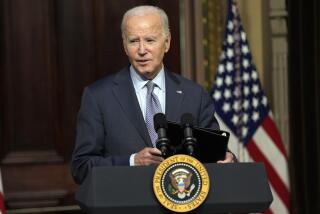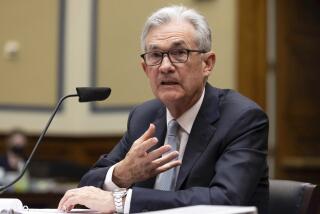Bush Isn’t Dukakis; U.S. Isn’t Like Massachusetts
- Share via
Remember Michael S. Dukakis? It is hard to believe that for a substantial period in 1988 he was actually the front-runner in the presidential race and that despite a notably incompetent campaign, he still did respectably in the election.
In the months after the election, Dukakis became a much-hated man, as the vaunted Massachusetts Miracle collapsed. Meanwhile, President Bush soared to unprecedented popularity.
Yet in many ways Bush and Dukakis are similar figures. Both are essentially non-ideological, preferring to emphasize details over the vision thing. Neither commands much personal allegiance.
As a result, the one-time popularity of Dukakis and the fading popularity of Bush depended on an unbroken record of good news. And both men, to put it simply, lied during the campaign--Dukakis by suppressing the growing evidence of economic and fiscal disarray in Massachusetts and Bush by making tax pledges that looked no more reasonable in 1988 than they have since turned out to be.
Now the American economy as a whole is weakening. Is Bush headed for a Dukakis-style collapse?
The answer is, probably not. America is not Massachusetts. And the contrast reveals much about why growing recession scares are overblown. Unless there is a spectacular policy error, Bush is safe from a Dukakis-style blowout--and the country, while not recession-proof, is not in danger of a Massachusetts-level day of reckoning.
The story behind the rise and fall of the Massachusetts economy is fairly clear. Since the decline of the traditional textile and shoe industries, the core of the New England economy has consisted of a set of knowledge-intensive sectors: computers, universities, hospitals.
What happened around 1980 was that essentially as a result of pure luck, demand for the products of those sectors surged. With the exploding power of modern computing, many businesses found that they could meet their needs with Digital Equipment’s minicomputers instead of International Business Machines’ mainframes. So sales of Massachusetts computer firms surged at other states’ expense.
The military buildup of President Ronald Reagan, with its emphasis on gadgetry, was a godsend for New England makers of high-tech killing machines. And so on. With New England’s “export” industries surging, service sectors--lawyers, bankers, retailers--experienced a derivative prosperity. And the overall growth in the regional economy generated a construction boom that itself added to the rapid expansion of jobs and incomes.
We all know the end of the story. The fundamental sources of Massachusetts prosperity were beginning to fade as early as 1986. The age of the minicomputer gave way to the age of the microcomputer--and PCs are a California, not a Massachusetts, specialty. The Pentagon was put on an increasingly short leash. And the boom itself contained the seeds of its own demise, by driving up housing and labor costs to an extent that made Massachusetts increasingly uncompetitive.
All this bad news was, however, masked for two more years by a runaway real estate boom that fed on itself--until the overbuilding became obvious and the bubble burst. Unemployment in New England has more than doubled, and the outlook seems to be for years of punishing recession.
Notice that Dukakis had nothing to do with any of this. He didn’t create the boom, and he didn’t cause the collapse. But he claimed the credit and took the blame.
It would be only poetic justice if the same thing happened to Bush. But it probably won’t, for two main reasons.
The less important reason is that the U.S. economy is much larger and more diversified than that of Massachusetts. Bad luck for one region is likely to be matched by good luck for another. Indeed, just during the past decade we have seen the Southwest, Northeast and Midwest take turns in leadership in economic growth.
But much more important, Bush has a guardian angel that Dukakis did not: the Federal Reserve Board. Many people still fail to appreciate the immense power that Fed Chairman Alan Greenspan and his institution exert over the economy. But that power is almost total. The Federal Reserve, by expanding liquidity, can always pull the economy out a recession, no matter how deep--as it showed in 1982. Or by tightening, it can rein in a boom, no matter how vigorous--as it showed in 1985.
The awesome power of the Federal Reserve was demonstrated in the aftermath of Black Monday in 1987. After a stock market crash of full 1929 proportions, the Fed’s expansionary policy not only prevented a depression, it actually led to an acceleration of economic growth.
To see why Bush is protected from a Dukakis-style calamity, imagine for a moment what it would be like if New England were a sovereign nation, with its own currency (the Yankee dollar?), and that the Federal Reserve Bank of Boston were an independent central bank, not simply a regional branch office. Now replay the tape of the 1980s. What would a responsible Boston Fed have done?
Clearly, when the New England economy began heating up in 1983 and 1984, the Boston Fed would have begun to tighten. This would have led to a rise in the Yankee dollar, which would have made New England business somewhat uncompetitive--but then that happened soon enough anyway. Meanwhile, the runaway construction boom would not have happened.
And when demand for New England specialties began to slacken, the Boston Fed would have loosened policy. Construction would have been buoyed by easy credit instead of collapsing, and a fall in the Yankee dollar would have made New England business more competitive again. The whole boom-and-bust cycle would have been smoothed out, perhaps completely avoided.
So should New England secede from the Union and adopt its own currency? Remember that New England is about the same size in both income and population as, say, Belgium. But an independent currency is probably not a good idea because there are trade-offs involved. Having a separate currency would impose massive inconveniences on business in New England. The inability to stabilize the economy is the price that we pay for avoiding these inconveniences.
But Bush is, as usual, a lucky man. His economy does have its own currency, and a highly professional Federal Reserve that will make sure that nothing very serious goes wrong with it. We are in for some bumpy times, but almost surely not a crisis.
More to Read
Get the L.A. Times Politics newsletter
Deeply reported insights into legislation, politics and policy from Sacramento, Washington and beyond. In your inbox twice per week.
You may occasionally receive promotional content from the Los Angeles Times.










